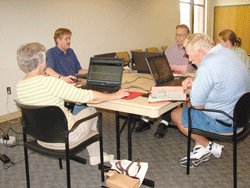September 24, 2009 at 7:58 a.m.
Library research specialist holds classes at branch libraries to help patrons use enhanced library edition of ancestry.com.
There's so much fascinating information on the web these days and websites are continually being updated and enlarged. It's all there for those who have a little knowledge about what's available and how to access this information. That's where the East Central Regional Library's reference specialist comes in. ECRL staff member Bob Gray is criss-crossing the library service region and giving free classes, sharing valuable tools to help you satisfy your curiosity with family history.
As a public service and in response to patron requests, the ECRL subscribes to the "Library Edition" of ancestry.com.
The library edition website is only available at a computer terminal in an ECRL branch building.
This is a massive database of digital versions of documents like census takers' handwritten notes, of county-by-county land sales records, of military files and all sorts of additional information.
People participating in Gray's class last week were amazed at the materials coming up on their computer screens and appreciative of tips Gray shared. His job is to know how to find information for all the patrons in the multi-county library system. Karla, the Chisago Lakes Branch Librarian, remarked that if Gray can't locate what you need, nobody can.
One of Gray's hobbies is researching his extended family and he's very enthused about certain web sites he's come across-- and impressed in general with the library edition of ancestry.com.
He has been getting anywhere from 20 to his smallest class of just two people at his trainings.
Classes are free. You get a folder of handouts with useful materials like government information request forms, a blank genealogy chart and a listing of useful website addresses.
He'll be doing a session in the North Branch Library, October 1. The class starts at 10 a.m. Contact the library if you think you'll be participating.
A few tips he shared at the Chisago Lakes Area Library class, include:
The Church of Latter Day Saints offers a terrific site at www.FamilySearch.org.
Gray said he was at a dead end on a relative he was tracing, when he tried this site and kind of stumbled onto the fact that what he thought was the middle initial of the relative was actually his first name. The website had the correct spelling too; which opened the door to accessing records from the relative's early 1800s life.
Websites will have you check a box that asks for "exact" matches in spellings or for "soundex" matches, which will search names that sound like the name you are researching. Start with exact matches, Gray explained, to save time, but don't shy away from the sound-alikes. The computer information is only as good as the original data and people make mistakes.
To drive home the point, he had the class solve a query to show how much they had learned. They went into the Internet to find out whose household a woman belonged to in 1920. The "father" was listed in census information as 89-years-old but search subject was 15. Other records, though, showed the father would have been 39 in 1920, so the census-taker's handwritten 'three' had mistakenly been typed in as an eight. "Be aware these things happen," Gray added.
A second website (that you can get outside the library) www.reflec tions.mndigital.org. is loaded with photos that are catalogued by Minnesota county. You can download and print most, for personal use like a scrapbook, for a $9 fee. Chisago County does not contribute to this site, however.
www.usgenweb.org is another good site. It offers information state-by-state.
The Minnesota Historical Society has a site at www.mnhs.org.
Some documents are limited by privacy issues, and some like death certificates end at the year 2001. The resource library has an email link that allows you to ask specific questions of a society media specialist or access a reference-only piece. And, if the historical society circulates a certain volume, the ECRL can request it be sent to a local branch.
www.archives.gov is maintained by the National Archives and Records Administration. Find immigration information, military service records (up through WWII) and much much more.




Comments:
Commenting has been disabled for this item.